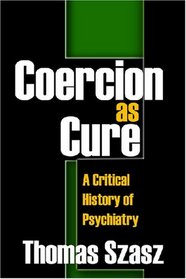Search -
Coercion as Cure: A Critical History of Psychiatry
Coercion as Cure A Critical History of Psychiatry
Author:
In this provocative new study of the history of pschiatry, Szasz challenges conventional beliefs about it. He asserts that, in fact, psychiatrists are not concerned with the diagnosis and treatment of bona fide illnesses. He contends that the truth about psychiatry, its self-evident ends, and the means used to achieve them is sociallly unac... more »
Author:
In this provocative new study of the history of pschiatry, Szasz challenges conventional beliefs about it. He asserts that, in fact, psychiatrists are not concerned with the diagnosis and treatment of bona fide illnesses. He contends that the truth about psychiatry, its self-evident ends, and the means used to achieve them is sociallly unac... more »
ISBN-13: 9780765803795
ISBN-10: 0765803798
Publication Date: 4/30/2007
Pages: 336
Edition: 1
Rating: ?
ISBN-10: 0765803798
Publication Date: 4/30/2007
Pages: 336
Edition: 1
Rating: ?
0 stars, based on 0 rating
Publisher: Transaction Publishers
Book Type: Hardcover
Other Versions: Paperback
Members Wishing: 0
Reviews: Amazon | Write a Review
Book Type: Hardcover
Other Versions: Paperback
Members Wishing: 0
Reviews: Amazon | Write a Review
Genres:
- History >> Historical Study & Educational Resources >> Social History
- Health, Fitness & Dieting >> Psychology & Counseling >> Mental Illness
- Health, Fitness & Dieting >> Psychology & Counseling >> Pathologies
- Medicine >> General
- Medicine >> Special Topics >> History
- Medicine >> Specialties >> Psychiatry >> General
- Medical Books >> Medicine >> Internal Medicine >> Psychiatry




